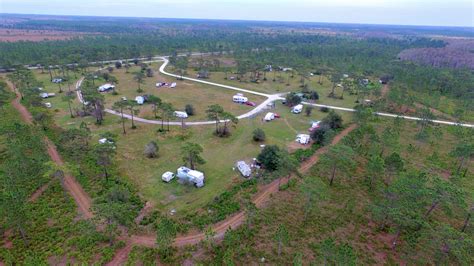Florida is known for its climate and outdoor recreation opportunities, making it a popular destination for those seeking adventure. Boondocking, or camping without hookups in a natural setting, is an increasingly popular form of outdoor recreation. While boondocking is allowed in many parts of the United States, including Florida, there are some restrictions and rules that must be followed.
Boondocking is typically allowed in state parks and national forests as long as the area is not designated for other uses. However, some state parks or national forests may not allow boondocking or may limit the number of days you can stay. It is important to check with the local park or forest headquarters before camping in the area to make sure you are following the rules.
In addition, Florida has a number of laws that specifically address boondocking. Boondocking is only allowed in designated areas, and campers must be respectful of the environment. For example, campers must not disturb any wildlife, cut down any trees, or leave behind any trash. Campers must also follow local ordinances and camp only in designated areas. Campers are also not allowed to camp in any state park for more than 14 consecutive days.
Finally, it is important to note that some private land owners may allow boondocking on their property, but it is important to get permission before camping on private land. Also, it is illegal to camp on private land without permission, so it is important to check local regulations before camping on any private land.
In conclusion, boondocking is allowed in many parts of Florida, but there are specific rules and regulations that must be followed. It is important to check with local park or forest headquarters before camping in the area, and to get permission from private landowners if you plan to camp on their land. By following these rules and regulations, you can enjoy a safe and enjoyable experience while boondocking in Florida.
Is Boondocking Legal In Florida? – A Comprehensive Look
Is boondocking legal in Florida? This is a question that many people who are interested in traveling and/or camping in Florida have asked in recent years. To answer this question, a comprehensive look at the laws and regulations in Florida regarding boondocking is needed.
Under the Florida Statutes, boondocking is allowed in certain parts of Florida, such as state parks, national forests, and monuments. Generally, the legal definition of boondocking is camping on public lands in an area that is not designated for camping. This can include public lands such as wilderness areas, abandoned mine sites, and beach areas. In Florida, boondocking is also allowed in areas such as state parks, national forests, and monuments.
When it comes to boondocking in Florida, there are some regulations and laws that must be followed. For example, boondocking is not allowed on private property. Boondocking is also not allowed on public land unless you have a permit or written permission from the landowner. Additionally, most areas of Florida do not allow overnight camping, so boondocking is not allowed in these areas either.
When boondocking in Florida, it is important to follow all applicable laws and regulations. The state of Florida has laws in place that limit the amount of time that a person can stay in one spot. For example, a person cannot stay in one spot for more than 14 days. Additionally, boondocking is not allowed on public lands if it is within 500 feet of any developed or improved area. There are also restrictions on the type of equipment that can be used while boondocking in Florida.
When it comes to the cost of boondocking in Florida, it is usually very affordable. Most campgrounds and other areas that allow boondocking do not charge for the use of their land. However, there may be some areas where a fee is required. Additionally, some campgrounds and other areas may require that a person has a permit before they can stay in the area.
In summary, boondocking is legal in certain parts of Florida, but there are some restrictions and regulations that must be followed. It is important to follow all applicable laws and regulations when boondocking in Florida in order to avoid any legal issues. Additionally, boondocking is usually very affordable and does not require a permit in most areas.
Exploring Boondocking Legality In The Sunshine State
Exploring the legality of boondocking is becoming increasingly important, especially in the Sunshine State of Florida. Boondocking is the term used for camping without an electrical hook up, often on public land. Some areas in Florida may not allow boondocking, and each county in the state has its own rules and regulations, so you must do your research prior to heading out.
Boondocking in Florida is generally allowed in most counties. However, you may be required to pay a fee if you are on public land and some areas may require you to obtain a permit. It is important to note that you must not stay in the same spot for longer than 14 days in a row or 30 days in a six-month period. Additionally, you must not camp in areas that are posted “no camping” or “no overnight stays”.
For those who prefer to stay in a more traditional campground or RV park instead of boondocking, Florida offers countless options. Campsites can range from basic, primitive spots to upscale luxury locations with numerous amenities. Prices vary depending on the type of campsite, location, and amenities offered.
To summarize, boondocking is legal in most areas of Florida, but you must do your research prior to heading out. You may need to pay a fee and obtain a permit if camping on public land, and you must not stay in the same spot for longer than 14 days in a row or 30 days in a six-month period. Additionally, there are many traditional campsites and RV parks available throughout the state. The table below provides a few examples.
| Type of Campsite | Location | Price |
|---|---|---|
| Primitive | Ocala National Forest | $7 per night |
| RV Park | St. Augustine | $35-$50 per night |
| Full Hook Up | Blue Springs State Park | $30 per night |
Exploring boondocking legality in the Sunshine State is an important consideration for any traveler looking to experience Florida’s wild and natural beauty. By researching regulations, paying applicable fees, and choosing the right type of campground or RV park, you can ensure a safe and enjoyable experience.
 Road Topic Tourism & Travel
Road Topic Tourism & Travel




